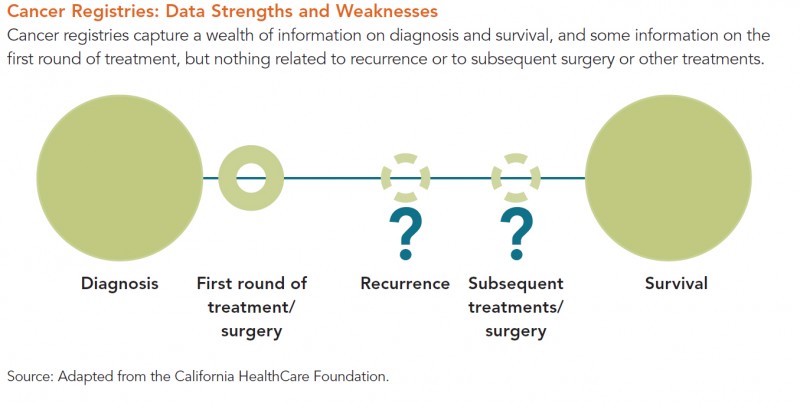Guest Blog: Fighting Cancer Means Fighting for Cancer Data
The second most common cause of death, cancer touches all of us. According to the Institute of Medicine, the numbers are only projected to increase and care costs are skyrocketing.Yet despite its toll, it’s virtually impossible to answer the question, “Who provides high quality cancer care?” This hinders patients, providers, payers, policymakers, and others to make informed decisions and improve the quality of care.
A lack of good measures isn’t the issue. The National Quality Forum and the American Society of Clinical Oncology —to name only two organizations – have produced well-accepted measures based on clinical evidence. They may not be perfect –we may want them to be more focused on health outcomes than care processes – but they are good enough to get us going.
What’s lacking is access to data to generate measures on a broad scale, across providers. Why? Each health plan maintains its own data. Proprietary and government entities, doctors and hospitals have their own data. Sometimes these data are merged for research or other purposes; sometimes they are shared; much of the time they aren’t.
Too often, useful data sets are generated and mined to answer a specific research question or proprietary need, then destroyed to comply with data privacy rules. All the while, all of us— those who receive, provide, and pay for care– remain in the dark about the quality of cancer care.
Hope and Challenges
The good news: providers in all 50 states are required to report every new case of cancer to their state cancer registry. Typically, these registries contain two important pieces of data about each cancer patient: 1) specific tumor information at diagnosis; 2) the fact and cause of death. No other source contains this information for the entire population of cancer patients in a state. That’s why state registries are uniquely positioned to contribute data central to assessing quality.
More good news: while these registries contain only limited specifics about the treatment provided, health plan claims/utilization data includes exactly this information in detail. As electronic health records advance and become even more widespread, they too can provide more clinical details.
The bad news: no one is currently combining state cancer registry data with other useful sources (like claims/utilization and EHR data) to publicly report cancer care quality measures by named provider. Indeed, state laws often prohibit it, given that most state registries were conceived of as public health surveillance tools.
A Path Forward
In 2013 the California HealthCare Foundation (CHCF) convened an expert workgroup to explore how the California Cancer Registry could be used to measure, publicly report, and improve the quality of care. Last month, CHCF hosted a briefing in Sacramento to discuss the panel’s work, including recommendations to enable the registry to expand its focus to include cancer care quality measurement and public reporting. An accompanying issue brief that includes model legislation was distributed. The path outlined for California is relevant and applicable to other states.
Data Advocates
There are many ways to advocate for a better tomorrow in cancer care. We wear ribbons and lapel pins; we walk and run to raise money. Meanwhile, efforts to get better data are relegated to wonky circles. But if we are to make good choices about where to get cancer care for our family members, friends and for ourselves, we need good data.
Shouldn’t the information housed in cancer registries – populated at their core by patients and supported with state and federal funds – be shared with the patient community to help inform choices about care, as well as with providers, plans and others to inform care improvements and network decisions?
We need to “free the data” so they can be used to help us understand more than we do about a disease that, in one way or another, impacts us all. In short, we need more cancer advocates to be cancer data advocates.
Stephanie Teleki, Ph.D. is a senior program officer at the California HealthCare Foundation (CHCF), an independent philanthropy based in Oakland, California. She leads CHCF’s work to promote improved information about cancer care quality and costs in California. The views & opinions expressed in any guest post featured on our site are those of the guest author and do not necessarily reflect the opinions & views of the National Coalition for Cancer Survivorship. Read our blog and comment policies here.






